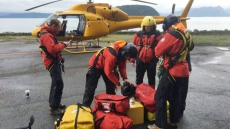EDMONTON — An extensive study of caribou herds across British Columbia and Alberta suggests a way to reverse a long and steady decline of the endangered species — kill more wolves and moose and pen pregnant cows.
"It's go hard or go home," said Rob Serrouya, a University of Alberta biologist and lead author of the study released Monday in the Proceedings of the National Academy of Sciences.
"Unfortunately, it's that black or white."
Another study released within days of Serrouya's suggests another way. And wildlife advocates worry Serrouya's findings could be misused, illustrating the complexity of what he calls the "toughest conservation challenge in North America."
Serrouya and his colleagues looked at 18 caribou herds ranging over more than 90,000 square kilometres. At the study's start in 2004, 16 herds were declining.
Restoring habitat damaged by oil, gas and forestry activity is too slow, said Serrouya. Herds don't have the decades that takes.
The scientists compared four government-run management programs — killing wolves, protecting pregnant cows, moving caribou between ranges and culling moose that attract predators. Six of the herds were not managed.
By 2018, the unmanaged herds remained unchanged.
But eight of the 12 managed herds improved. Half of them had either stabilized or begun increasing. One almost doubled over three years to 67 from 36 animals.
"That's almost unprecedented," Serrouya said.
"It doesn't mean recovery, but it means some of these herds have turned around. It's the first study to show management has turned around sharp declines of caribou on such a broad scale."
Herds with the best growth rates were linked to both maternity pens to protect pregnant cows during calving and extensive wolf kills. Ranges with the best herd growth had the most intense cull.
Those five ranges saw a total of 144 wolves killed every year, mostly by aerial gunning and strychnine. A cull that large over the entire study area would result annually in nearly 650 carcasses, although Serrouya said that's not being recommended.
Removing moose at the same time would allow managers to kill up to 80 per cent fewer wolves, he said. Still, moose numbers in any one range would have to be reduced by up to 83 per cent.
Jonah Keim, an independent biologist and consultant, offers a different solution. In research published in the British Ecological Society's journal, he suggests caribou can be adequately protected by making it tough for wolves to get to them.
"What we need to do is reduce the encounters between wolves and caribou," he said. "You can do that without reducing the number of wolves."
Between 2011 and 2014, Keim studied what would happen if it weren't so easy for wolves, deer and moose to follow cutlines and forestry roads into caribou habitat. Over an 800-square-kilometre area, researchers dropped 200 cubic metres of tree debris every 200 metres.
The rate at which wolves stopped using the paths dropped 70 per cent, the study found.
"It was unbelievably effective at reducing wolf use," said Keim.
Serrouya applauded Keim's paper, but questioned its practicality on a landscape with 350,000 kilometres of linear disturbance.
"To block 350,000 kilometres would take years and years," he said. "What would happen in the meantime?"
Four herds vanished between 2004 and 2018.
Keim said efforts could be focused on where they'd do the most good. He suggested that snowmobile trails could be designed to draw wolf packs away from caribou. It wouldn't be that hard, he said.
"That type of work can be done in the summer or winter by somebody on foot."
Carolyn Campbell of the Alberta Wilderness Association fears Serrouya's findings could be used to declare "a war on wildlife."
"These findings could be used by industry and government to prolong unsustainable forest exploitation while endlessly harming wildlife species," she said.
She urged governments to keep restoring habitat.
Serrouya said drastic measures will be needed into the foreseeable future.
"Society would have to change the way it values natural resources. Society would have to decide to reduce the rate of resource extraction."


